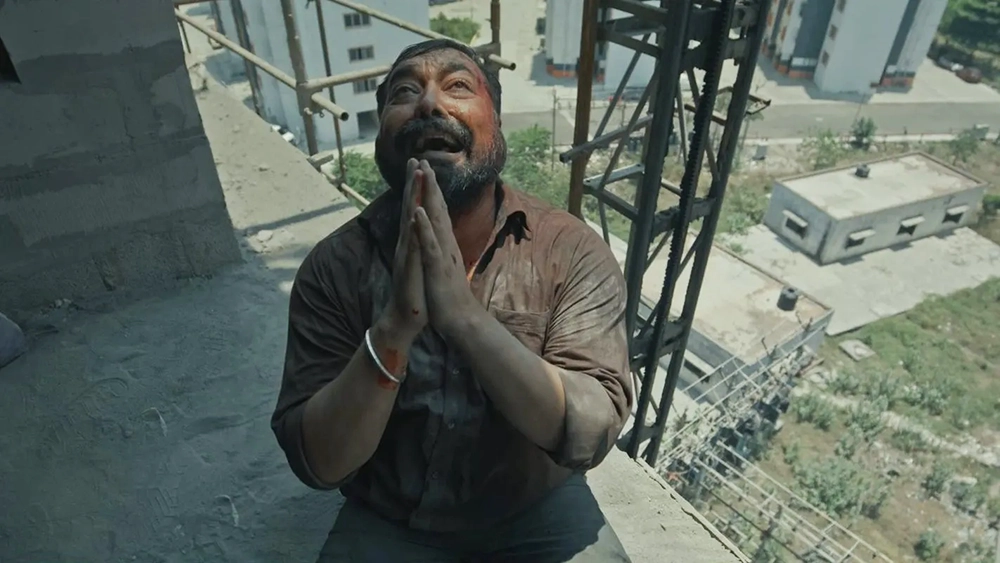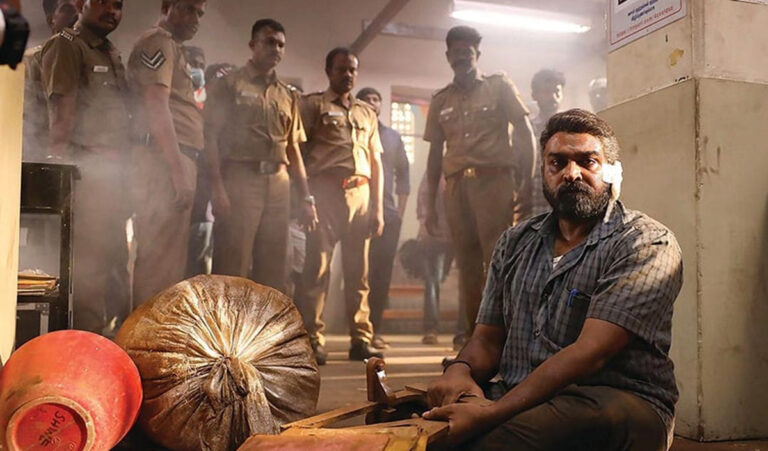A good-natured and strong-willed (yet poor) local barber named Maharaja (Vijay Sethupathi) enters a local police station with a seemingly trivial problem. His beloved rusty iron dustbin named ‘Lakshmi’—revered as a deity in his home due to a miraculous and life altering accident—has gone missing during an almost fatal robbery attempt. This case of a missing dustbin, his bizarre emotional connection to it, and his tall tales of ‘a masked man with a nose protruding from his back’ soon pushes up a whole lot of dirty laundry. In fact, “Maharaja” itself comments on the the system and society alike, literally turning the police station inside out and leads the cops on a frantic game of cat and mouse as well as a DIY side project.
It’s inevitable “Maharaja” will invite comparisons to predecessors such as the critically-acclaimed “Mom” and “Three Billboards Outside Ebbing, Missouri,” since it falls under the revenge/thriller genre. Like those films, it’s also equally visceral in its exploration of sexual violence against women and lingering trauma. The film also questions why the fairer sex are revered yet simultaneously robbed of dignity and preyed upon in an inhumane fashion. While the majority of its scenes of sexual violence occur off-screen, the brutality and nonchalance of the perpetrators still strikes a nerve. It offers a gritty but not entirely surprising insight into the depravity of men. And still, “Maharaja” expands upon the gross injustice by depicting how the layperson is treated grossly for simply demanding accountability. They are forced to endure humiliation from authority figures who are easily convinced by money under the table and indulge in malpractices in plain view themselves.
A Film Intertwined with Symbolism
The serpentine manner of storytelling of “Maharaja” is also its crown jewel, with the various intertwining subplots compatibly spliced together by Editor Philomin Raj. Recurring motifs—such as a venomous serpent, a nest of rats dislodged by Maharaja from the loft of the police station during a tussle—shows a location in which law & order has already become suspect. The visuals also become the driving force for a hero’s journey.
The story of Lakshmi (whom Maharaja refuses to label as a mere prop for reasons that are gradually revealed in a hard-hitting fashion) are utilised to create an absorbing viewing experience and hold a greater meaning. Even the name ‘Maharaja’ (which translates to ‘king’) is symbolic in itself, since it reflects the ideals of an ‘ordinary’ but noble protagonist who lives up to his name through his brave and selfless actions. Parallels also abound between Maharaja and the antagonist Selvan (Anurag Kashyap), both of whom are proud ‘girl dads.’ They fuss over their princess daughters, especially when choosing a unique birthday gift (a pendant and a statue immortalising maternal instinct respectively), thus setting up their paths to ultimately converge.
“Maharaja” is also technically sound, with stunt sequences that are well-coordinated, albeit graphically violent and gory, and certainly not meant for the faint of heart.

Vijay Sethupathi’s ability to subtly emote with his eyes and a rugged, intimidating physicality prove to be his greatest strengths in the titular role. He’s a gentle giant who doesn’t let things go easily (at times literally, as witnessed in an introductory scene wherein Maharaja bends metal poles with superhuman, logic defying strength). He is also prone to yielding to the ‘demon barber’ within—a persona that is only unleashed from the depths of grave trauma.
An Unforgettable yet Unsettling Film
The actor’s versatility further shines through as he seamlessly transitions between a multitude of emotions, ranging from talkative, curious, innocuous, tearful to shell-shocked as he transforms into a vigilante under tragic circumstances. Renowned Bollywood filmmaker Anurag Kashyap, who is known to dabble in complex antagonistic roles when he’s not behind the camera, plays the utterly barbaric Selvan. A deplorable criminal by night and shopkeeper/family man by day, he impresses with his ability to match steps with Sethupathi. Natty Subramaniam is also compelling in the pivotal role of the morally ambiguous Inspector S. Varadharajan.
If you’re on the lookout for movies that leave an unforgettable impression with a nonlinear narrative, terrific performances, gradual revelations, and sensitive yet timely themes subtly interwoven amidst striking imagery, “Maharaja” won’t disappoint. However, be warned that it is also deeply unsettling.

“Maharaja” is available on Netflix


